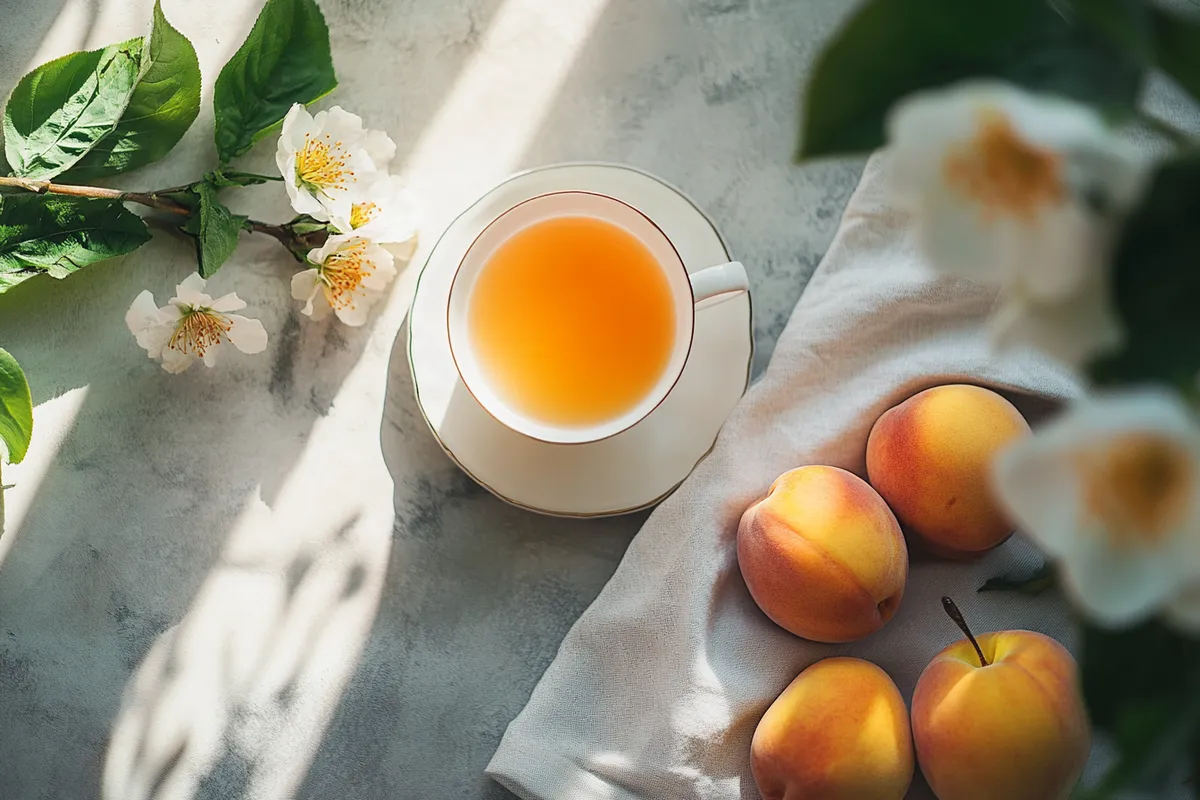Discover the remarkable peach tea benefits that support your health, wellness, and pure enjoyment in every delightful sip.
Peach tea stands out as a naturally sweet and fragrant beverage that many people adore. Indeed, it blends fruity goodness with the soothing qualities of tea leaves. Peach tea benefits range from supporting digestion to improving skin health. Altogether, it is a drink that deserves a closer look.
Because peach tea offers both flavor and nutritional advantages, tea enthusiasts often embrace it as part of a daily ritual. Furthermore, its versatility makes it perfect for any season. Brew it hot for a cozy winter treat, or enjoy it iced to cool down during summer. Basically, it caters to every taste and preference. Eventually, peach tea can become a tasty and beneficial addition to your lifestyle.
What Is Peach Tea?
Peach tea is a beverage infused with either real peaches, peach flavoring, or peach extracts combined with tea leaves. Typically, you will find black, green, or oolong teas infused with peach essence. Another popular approach involves blending herbal components, such as chamomile or rooibos, with dried peach pieces. This unique combination creates a refreshing, fragrant, and sweet infusion.
Historically, peaches hold significance in many cultures. In ancient China, peaches symbolized longevity and immortality. Consequently, the pairing of peaches with tea leaves has a long heritage. Indeed, many cultures have recognized peach tea benefits for centuries, even if they used different methods of infusion than we do today.
Because peach tea can be made in various ways, you can always find a style that suits your taste. Some prefer naturally flavored black peach tea, while others enjoy lighter, more delicate herbal peach blends. Comparatively, each preparation method offers its own charm. Regardless, the result is usually a soothing beverage with a sweet aroma.
Nutritional Profile
Peach tea contains essential vitamins and minerals derived from both the peaches and the tea leaves themselves. Though the exact nutritional content depends on how the tea is prepared, you can generally expect small amounts of vitamins A, C, and E. Particularly, vitamin C may help boost immunity and support healthy skin. Meanwhile, tea leaves often include polyphenols, which are known for their antioxidant properties.
Flavonoids, such as catechins found in green tea, may also be present in certain varieties of peach tea. Conversely, black tea varieties include theaflavins, which also carry antioxidant capacities. Therefore, peach tea can contribute to your daily antioxidant intake. Equally important, the sweetness from peaches can often reduce the need for added sugar. Thus, you can enjoy a mildly sweet beverage without overconsuming sweeteners.
Because hydration is crucial for overall health, choosing a flavorful beverage like peach tea can encourage you to drink more fluids. It thus supports normal bodily functions. Generally, those who prefer a caffeine-free drink can select a purely herbal peach infusion with no tea leaves. Conversely, if you desire some caffeine, you can opt for black peach tea or green peach tea.
Primary Health Benefits
Below are key peach tea benefits that many enthusiasts appreciate. Each advantage contributes to overall well-being when peach tea is consumed regularly, as part of a balanced lifestyle.
Boosting the Immune System
Peach tea often contains vitamin C, especially when real peaches or extracts are used. Chiefly, vitamin C plays a vital role in the body’s immune defense. It helps support white blood cells in battling pathogens. Eventually, regular intake might help your body maintain a robust immune response.
Additionally, the polyphenols found in tea leaves can work synergistically with vitamin C. This combination may provide extra antioxidant protection. Accordingly, you might notice improved resilience against everyday stressors. However, peach tea alone cannot replace a balanced diet and healthy habits. Nonetheless, it can contribute positively to your daily nutrient intake.
Aiding Digestive Health
Many people enjoy peach tea benefits for digestion. Particularly, warm, soothing tea can calm an upset stomach. When peaches are included, dietary fiber in the fruit may also support healthy bowel function. Consequently, if you brew peach tea with real peach slices, you might experience mild digestive comfort.
Herbal blends with ginger or chamomile might enhance these digestive benefits. For instance, ginger has historically been used to ease nausea, while chamomile can soothe the digestive tract. Altogether, combining these ingredients with peach tea can create a more extensive support system for digestion.
Supporting Weight Management
Peach tea tends to be lower in calories, especially if enjoyed without added sugar or sweeteners. Therefore, choosing peach tea instead of high-calorie beverages can contribute to weight management. Indeed, the natural sweetness of peaches may curb sugar cravings. Meanwhile, hydration plays a critical role in helping the body function efficiently. That includes metabolic processes.
Green tea peach blends offer additional benefits. Specifically, green tea has compounds known to support metabolism and fat oxidation. Thus, when combined with peach flavor, it makes a satisfying and possibly helpful beverage for those watching their weight. Nonetheless, consistent exercise and a balanced diet remain the pillars of weight control.

Enhancing Skin Vitality
Peach tea contains antioxidants that may protect cells from oxidative stress. Over time, oxidative stress contributes to visible signs of aging. By incorporating antioxidant-rich foods and beverages, you can provide supportive measures for your skin. Particularly, vitamin C helps with collagen production, which is vital for skin elasticity. Furthermore, hydration from drinking tea regularly keeps your skin looking supple.
Indeed, many beauty enthusiasts note that consistent intake of antioxidants can create a subtle glow. However, no single food or drink can completely transform your skin. Consistency in your skincare routine, coupled with a wholesome diet and hydration, is paramount. Therefore, think of peach tea as part of a larger wellness approach.
Promoting Relaxation and Stress Relief
Certain peach tea blends include herbal components like chamomile or lavender. These herbs are known for their calming effects. Comparatively, the sweet, fruity aroma of peach can create a pleasant sensory experience. Consequently, sipping peach tea in a quiet environment can be a soothing ritual.
If you choose a peach-flavored black or green tea, the moderate caffeine content might provide gentle alertness. Still, it can be less intense than coffee. Basically, peach tea can be a balanced approach to relaxation and mild stimulation. Either way, the act of sipping something warm can naturally encourage mindfulness. Particularly, this can reduce stress levels in daily life.
Varieties of Peach Tea
Because tastes differ, you can find many peach tea varieties on the market. Selecting the one that best suits you depends on your flavor preferences and caffeine tolerance.
- Black Peach Tea: Uses black tea leaves. Tends to have a stronger flavor and a moderate caffeine level.
- Green Peach Tea: Often lighter in taste with a fresh aroma. Contains some caffeine and beneficial catechins.
- Herbal Peach Infusions: Contains no true tea leaves. Usually caffeine-free. Can include chamomile, rooibos, or hibiscus.
- Iced Peach Tea: Perfect for summer. Typically brewed stronger and served over ice with peach slices.
- Hot Peach Tea: Ideal for colder weather. Brewed at lower temperatures or steeped gently to preserve flavor.
Meanwhile, some brands might add spices, like cinnamon or ginger, to create a bolder taste. Others focus on purely fruity notes. Consequently, you can easily explore a wide range of flavors. Because variety is abundant, experimentation is encouraged to find your personal favorite.
How to Brew Peach Tea
Brewing peach tea properly can unlock its full range of flavors and peach tea benefits. First, decide on the type of tea leaves or blend you want. If you use loose-leaf tea, measure about one teaspoon per cup. If you use tea bags, follow the instructions on the package.
- Water Temperature:
- Black peach tea: around 200°F (93°C)
- Green peach tea: around 175–185°F (79–85°C)
- Herbal peach infusion: boiling water (212°F or 100°C)
- Steep Time:
- Black peach tea: 3–5 minutes
- Green peach tea: 2–3 minutes
- Herbal infusions: 5–7 minutes
Afterward, you can adjust the steep time to taste. Over-steeping can result in bitterness, while under-steeping may produce a mild flavor. Additionally, you can add sweeteners like honey or agave. However, if you use high-quality peach tea, you might not need extra sugar. Finally, garnish with fresh peach slices for visual appeal and added flavor.

Comparisons with Other Fruit Teas
Peach tea is not the only fruit-infused option available. Indeed, many fruit teas share some similarities. However, each fruit infusion has distinctive qualities:
- Peach Tea vs. Raspberry Tea: Raspberry tea often has a tangier flavor. Peach tea is sweeter and milder.
- Peach Tea vs. Lemon Tea: Lemon tea can be more acidic and tart. Peach tea offers a softer, sweeter taste.
- Peach Tea vs. Hibiscus Tea: Hibiscus tea has a bright color and a tart, cranberry-like flavor. Peach tea remains mellow and fruity.
Altogether, each type of fruit tea can deliver its own set of nutrients and antioxidants. Nonetheless, peach tea benefits stand out due to the presence of vitamins, antioxidants, and a gentle flavor. Consequently, it can appeal to a broader audience that prefers sweetness over tartness.
Potential Myths and Misconceptions
Although peach tea benefits are plentiful, it’s important to address some myths:
- Artificial vs. Natural Flavoring
Some assume all peach teas contain artificial flavoring. Nevertheless, many brands use real peaches or natural extracts. Reading labels can clarify whether a product includes artificial ingredients. - Sugar Content
Many believe peach tea is always high in sugar. In truth, a homemade or naturally flavored peach tea often requires no extra sugar. Comparatively, sweetened canned or bottled versions can contain added sugars. Checking nutrition labels or making your own brew at home is wise. - Caffeine Levels
Some people fear peach tea will be too stimulating. In fact, caffeine levels depend on the type of tea leaves used. Herbal peach teas typically have zero caffeine. Black or green varieties contain moderate caffeine, which is usually less than a standard cup of coffee.
Overall, debunking these misconceptions helps people fully appreciate the genuine peach tea benefits. By choosing high-quality, naturally flavored products and brewing responsibly, you can enjoy peach tea as part of a healthy routine.
Possible Side Effects and Precautions
Peach tea is generally safe for most individuals. However, there are considerations:
- Allergies: If you have a known peach or stone fruit allergy, exercise caution. Check labels, and seek medical advice if unsure.
- Sensitivity to Caffeine: If you are sensitive to caffeine, choose herbal peach infusions. Even moderate amounts of caffeine can disrupt sleep in some people.
- Overconsumption: Drinking excessive amounts can lead to an imbalance of fluid intake or mild gastrointestinal discomfort. Moderation ensures you maximize peach tea benefits without adverse effects.
Until you know how your body responds, start with a small cup and observe. Consequently, you can gradually increase your intake if desired. Particularly, pregnant or nursing mothers should consult a healthcare provider, especially if the tea contains caffeine or other herbs.
Sourcing and Sustainability
Supporting ethically sourced and eco-friendly peach tea products benefits the environment and communities. Reputable brands often highlight fair-trade certifications, ensuring farmers receive fair wages. Furthermore, sustainable farming practices reduce environmental damage. For example, shade-grown tea plantations preserve biodiversity.
Packaging also matters. Many brands now offer compostable or biodegradable tea bags. Additionally, loose-leaf teas often come in recyclable canisters. Because consumers hold the power, prioritizing sustainable options can drive positive changes. Altogether, choosing responsible brands can multiply the positive impact of peach tea benefits by supporting ethical sourcing and a healthier planet.
Storage and Shelf Life
Proper storage can preserve flavor and ensure you reap maximum peach tea benefits. Keep your peach tea in a cool, dry place away from direct sunlight. Exposure to moisture or heat can degrade the delicate flavors and antioxidants. For best results, store loose-leaf tea in airtight containers.
Likewise, if using tea bags, keep them sealed until use. Once a package is opened, try to finish it within six months. Eventually, old tea can become stale and lose potency. Nonetheless, it may still be safe to consume past its prime, though flavor and quality will diminish.
Expert Tips and Serving Suggestions
Tea experts often recommend experimenting with different ingredients to enhance peach tea. Consequently, you can create new flavor combinations and experiences.
- Add Fresh Herbs: Mint, basil, or lemongrass can provide extra aroma.
- Use Spices: A hint of cinnamon or a piece of fresh ginger can add warmth.
- Blend with Other Fruits: Mango, pineapple, or berries create tropical twists.
- Serve with Dessert: Pair peach tea with light pastries or fruit-based desserts.
Another wise tip: choose good water. Water quality can affect tea’s taste. Filtered or spring water is often recommended to bring out a cleaner flavor. Finally, avoid boiling water for green tea. Doing so ensures you do not scorch the delicate leaves. Consequently, you get a smoother taste.

Frequently Asked Questions (FAQs)
What is peach tea good for?
Peach tea is good for delivering antioxidants, vitamins, and hydration. Generally, it can support healthy digestion, aid in immune function, and offer a soothing, aromatic experience. Additionally, it provides a naturally sweet flavor that can reduce the need for added sugar.
Is peach tea good for losing weight?
Peach tea is typically low in calories. Consequently, it can serve as a healthier alternative to sugary drinks. Green peach tea, in particular, includes compounds that may support metabolism. However, maintaining a balanced diet and regular exercise remains key to effective weight management.
What are the benefits of drinking peach?
Peaches are rich in vitamins, antioxidants, and dietary fiber. Drinking peach-infused beverages can provide a gentle infusion of these nutrients. Over time, consistent consumption of peach-infused drinks may support immune health, enhance digestion, and even contribute to healthier skin.
Is peach tea good for the skin?
Yes. Because peach tea contains antioxidants like vitamin C, it can support skin health by combating oxidative stress. Moreover, regular hydration from tea can keep skin looking vibrant and supple. Although it’s not a magic solution, peach tea complements a healthy skincare regimen.
Conclusion
Peach tea benefits cover a broad spectrum, from supporting digestive health to contributing to skin radiance. Its sweet and aromatic qualities make it a preferred beverage for many. Comparatively, you can choose between hot or iced, caffeinated or caffeine-free varieties, and still enjoy the same underlying advantages.
Moreover, the versatility of peach tea allows creative exploration. Brew it at home with fresh peach slices, or find ready-made blends in stores. Because it suits different preferences, you can likely find a peach tea that aligns with your taste buds. Eventually, you might even discover new ways to incorporate peach tea into everyday routines, whether for wellness, relaxation, or enjoyment.
In summary, peach tea delivers a delightful combination of flavor and function. Indeed, its potential health perks are extensive. Nevertheless, remember to practice moderation and maintain an overall balanced lifestyle. In doing so, you can enjoy this sweet infusion guilt-free while reaping the benefits of each soothing sip.
Recipe: Homemade Peach Tea
Below is a simple yet flavorful recipe to help you enjoy peach tea benefits at home. This recipe combines fresh peaches with black tea to create a refreshing beverage you can enjoy hot or cold.
Ingredients:
- 4 cups of water
- 2 tablespoons of loose black tea leaves (or 4 black tea bags)
- 2 ripe peaches, sliced
- 1 tablespoon honey or sweetener of choice (optional)
- A handful of ice cubes (if serving iced)
Step-by-Step Expanded Instructions:
- Boil the Water
Bring 4 cups of water to a rolling boil. Because black tea requires higher temperatures, a full boil ensures proper extraction. - Add Tea Leaves or Bags
Turn off the heat and carefully add the black tea leaves (or tea bags) to the water. Steep for 3 to 5 minutes. Adjust steeping time for your preferred strength. - Prepare the Peaches
While the tea steeps, wash and slice 2 ripe peaches. Ensure they are free of any bruised or spoiled areas. Consequently, you maintain a fresh, sweet taste. - Combine Peaches with Tea
Once steeped, strain out the tea leaves or remove the tea bags. Add the sliced peaches to the pot. Let them sit in the warm tea for about 5 minutes to release flavor. - Sweeten as Desired
Stir in honey or your preferred sweetener if you desire extra sweetness. Nevertheless, the natural sweetness of peaches may be sufficient for many palates. - Cool and Serve
If you want iced tea, allow the mixture to cool to room temperature. Then, pour over ice in tall glasses. If you prefer hot peach tea, serve immediately in a warm mug. Garnish with additional peach slices for an appealing touch.
Nutritional Content (per 100g)
| Nutrient | Amount |
|---|---|
| Calories | 15 kcal |
| Carbohydrates | 3 g |
| Sugars | 2 g (natural) |
| Protein | 0 g |
| Fat | 0 g |
| Vitamin C | 1-2 mg |
| Caffeine | 10-20 mg (approx.) |
